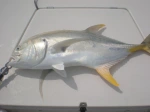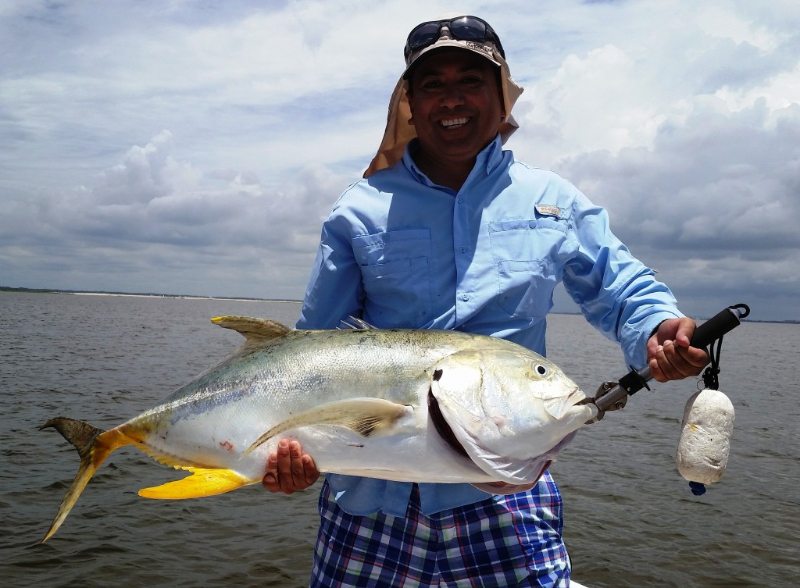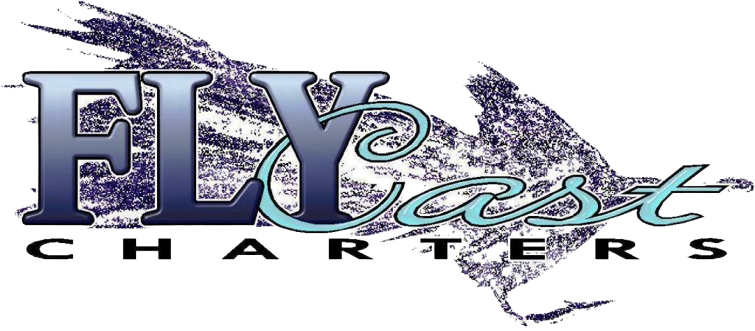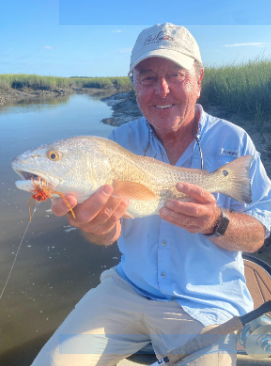The Crevalle Jack
Caranx hippos
Also known as the common jack, black-tailed trevally, couvalli jack, black cavalli and yellow cavalli is a common species of large marine fish classified within the jack family, Carangidae. The crevalle jack is distributed across the tropical and temperate waters of the Atlanta Ocean. The crevalle jack inhabits both inshore and offshore waters to depths of around 350 m, predominantly over reefs, bays, lagoons and occasionally estuaries. Young fish dispersed north by currents in the eastern Atlantic are known to migrate back to more tropical waters before the onset of winter; however if the fish fail to migrate, mass mortalities occur as the temperature falls below the species tolerance limits.
The crevalle jack is a powerful predatory fish. This is a school of big Jacks cruising through water ready to eat anything that gets in their way. We use the motor to get close to the school. Then we use the trolling motor to get in front of the fish. When Capt. Dave puts the boat in the perfect position, you cast in front of the school, and hold on. It is a thrill to watch 30 lb Jacks fight for your fly. They are an aggresive and opportunistic feeder.
The crevalle jack is also a revered gamefish, taken both by lures and bait.
Summarized from Wikepedia.
Fly Fishing For Jack Crevalle
Jack crevalle are a popular game fish found in tropical and subtropical waters around the world. They are known for their aggressive behavior and acrobatic jumps, making them a challenging and rewarding fish to catch on the fly.
Here are some tips on how to fly fish for jack crevalle:
- Choose the right fly. Jacks are opportunistic feeders and will eat a variety of flies, but some of their favorites include streamers, poppers, and baitfish imitations. When choosing a fly, it is important to consider the water conditions and the time of day. For example, in clear water, you may want to use a smaller, more natural-looking fly. In dirty water, you may want to use a larger, more flashy fly.
- Use the right gear. Jack crevalle are strong fish, so it is important to use the right gear. A 9-weight fly rod is a good all-around choice, but you may want to go up to a 10-weight if you are fishing in heavy cover. A floating line is a good choice for most situations, but you may want to switch to a sinking line if you are fishing in deep water.
- Find the right spot. Jacks are found in a variety of habitats, but they are most commonly found in shallow, brackish water near inlets, jetties, and bridges. They are also known to frequent areas with heavy vegetation, such as mangroves and seagrass beds.
- Present the fly correctly. When presenting the fly, it is important to make sure that it is moving through the water in a natural way. A good way to do this is to use a retrieve that mimics the movement of a baitfish. You can also use a variety of casts, such as the roll cast, the overhead cast, and the side cast, to get the fly into the right spot.
- Be patient. they can be finicky eaters, so it is important to be patient when fishing for them. Don’t get discouraged if you don’t get a bite right away. Just keep casting and presenting the fly in a natural way, and you will eventually get a fish to eat.
With a little practice, you will be catching jack crevalle on the fly in no time. So get out there and start fishing!
Here are some additional tips that may help you catch more jack crevalle:
- Fish during the early morning or late evening hours. Jack crevalle are most active at dawn and dusk.
- Look for schools of fish. Jack crevalle are often found in schools, so it is important to look for signs of activity, such as splashing or feeding fish.
- Use a variety of flies. Jack crevalle are opportunistic feeders, so they will eat a variety of flies. Experiment with different flies to see what works best in your area.
- Be persistent. Jack crevalle can be tough to catch, but they are also very rewarding. Don’t give up if you don’t get a bite right away. Just keep casting and presenting the fly in a natural way, and you will eventually get a fish to eat.
I hope these tips help you catch more jack crevalle on the fly. Good luck!




